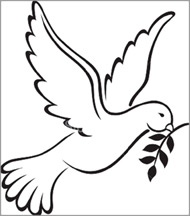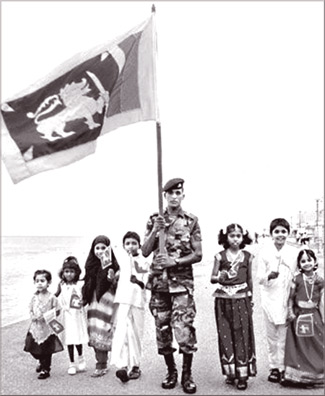Armed Forces and Sustainable Development
Lionel WIJESIRI
If an average Sri Lankan was asked to name one organization that
continues to do the nation proud after about 64 years of independence,
the answer would probably be the Armed Forces. This institution has
remained apolitical, insular and superbly efficient unlike the general
deterioration of virtually every other establishment of the same
vintage. Be it in their primary role of defending against aggression
from any front, or helping civilians during natural or man-made
disasters, our Armed Forces have conducted themselves exemplarily each
time they have been called to action. This track record is reflected
even in global theatres where the Forces have won admiration and
accolades for the country.
 With the successful completion of the war against LTTE, the Sri
Lankan Armed Forces have begun to play a significant new role in the
sustainable development, in addition to the national security.
Secretary, Presidential Task Force for Resettlement, Development and
Security, S. B. Divarathne recently categorised four key aspects of
nation building which require intervention by the Armed Forces. (1)
Maintenance of essential services in the immediate aftermath of a
humanitarian operation, (2) partnering in resettlement activities
including demining activities and restoration of damaged infrastructure,
and restoring national irrigation systems (3) provision of skilled
labour to improve the quality and standard of vocational training, (4)
information management and administration to increase productivity in
public sector. With the successful completion of the war against LTTE, the Sri
Lankan Armed Forces have begun to play a significant new role in the
sustainable development, in addition to the national security.
Secretary, Presidential Task Force for Resettlement, Development and
Security, S. B. Divarathne recently categorised four key aspects of
nation building which require intervention by the Armed Forces. (1)
Maintenance of essential services in the immediate aftermath of a
humanitarian operation, (2) partnering in resettlement activities
including demining activities and restoration of damaged infrastructure,
and restoring national irrigation systems (3) provision of skilled
labour to improve the quality and standard of vocational training, (4)
information management and administration to increase productivity in
public sector.
The role for the Armed Forces in national development is an
interesting topic that will attract different reactions from different
people and organisations. While some private sector organisations and
NGOs may see it as an incursion into their terrain, the civilians who
have enjoyed the robust relationship with the military personnel will
see it as a welcome development.
Involvement
Over the past few decades, governments throughout the world have
begun to adapt their military strategies to include plans for
development. This change is due to the increasing acceptance of the idea
that development brings peace and stability.
However, there is a significant debate surrounding this change in
strategy. Some support Armed Forces involvement in development efforts
and believe military strategies can be effective in completing certain
development initiatives. Others believe that development is best left to
the government officers and those private organizations that are not
associated with military operations.
Contrary to the pessimists’ view, domestic Armed Forces actually
serve many positive roles for sustainable development once good
civil-military relations are present. To hasten socio-economic
development, the missions of Armed Forces can be modified from a
traditional war-fighting machine to a focus on both war-fighting and
development-implementing, especially when only a few external or
internal conflict threats exist. Armed Forces can thus serve as direct
development project/programme implementers to enhance state service
delivery capacity and to modernize the population.
In Senegal, for instance, the Senegalese Armed Forces have an
‘Army-Nation’ component that conducts activities in public health care,
infrastructure provision, and re-integration for demobilizing soldiers.
Each of these is seen as directly contributing to security, so that the
Armed Forces operate within their realms, and each clearly impacts the
broader development of the country. According to the Gallup World Poll,
the Senegalese Armed Forces are indeed the country’s most trusted
institution among the populace.
Advantages
Armed Forces should be strongly considered for complementing civilian
development organizations, both private and public, due to several
comparative advantages in state capacity enhancement that Armed Forces
have. For example, (1) culture of expedience and order-taking; (2) vast
resource availability for manpower, infrastructure, and technology; (3)
partnership possibilities for technology transfer; (4) human capital in
a variety of skill sets since Armed Forces are societies within
societies; (5) direct line to the country’s Head of State for ease of
coordination and funding; and (6) few limits on areas of operation since
Armed Forces have security training and weaponry for insecure places
along with adequate transportation vehicles for remote locations.
 |
|
Unity our
strength |
Along with these advantages, Armed Forces are significant sources of
modernization in some ways such as: (1) source of hope and
social-climbing for lower classes through a meritocracy; (2) social
solidarity effects of forging a national identity; (3) international
exposure for soldiers that increases idea-sharing; and (4) source of
education and skills-training, especially when military skills relate to
the socio-economic realm so that soldiers find related work after
demobilization.
However, the importance of strong civil-Armed Force relations cannot
be overlooked before any of these comparative advantages can be
realized. Civil-Armed Force relations based in norms of military
subordination to civilian authority is the only sustainable means of any
policy regarding the Armed Forces’ function. To make this recommended
policy workable outside the traditional role and operations of Armed
Forces, strong civil-Armed Force relations are a prerequisite, with a
professionalized Armed Forces and a civilian leader who respects the
Armed Forces.
Nation-building
The 21st century looks towards security, justice, economic
development and a democratic polity as the pillars of nation building.
Security comes first in the pecking order because the other three
pillars function effectively only if the security threshold on the
nation, both internal and external, remains intact. This in turn
facilitates smooth functioning of democracy and brings in its wake
social justice and economic development.
Understanding the functional imperative of Armed Forces primarily as
response to threat - whether internal or external - also downplays the
important domestic socio-political role they often play, broadly
categorized here as ‘nation-building’.
Armed Forces can play a nation-building role in two main ways. First,
they can act as a symbolic representation of national sovereignty and
values and a vehicle for promoting those values through universal male
conscription.
These roles are perhaps most signi?cant in multinational states, but
are also important elsewhere as well. In the Soviet Union, for example,
conscription into the Armed Forces was one of the only truly common
experiences. Military service was explicitly used as a mechanism to
transmit ‘national’ values to all parts of the male population,
regardless of ethnic background.
Similarly, across Europe today, arguments in favour of retaining
conscription have often centred less on its utility in the face of
changing functional imperatives and more on its important role in
embedding the Armed Forces within the societies of which they are a
part. In turn, the Armed Forces identify themselves as a fulcrum in the
relationship between citizens and the state.
The Armed Forces can also be used a manpower resource on which the
government can draw to support civilian infrastructure projects. This is
a role that Armed Forces have commonly ful?lled in the past. In many
countries, conscript labour was often used in agricultural or
infra-structure projects. These nation-building roles remain strong and
are becoming stronger. This role ful?ls important socio-political
functions and is emerging as an important mechanism for legitimating the
existence and budgetary claims of Armed Forces in the eyes of the wider
society.
Under other circumstances, the Armed Forces can also be used as a
parallel or substitute provider of state goods - such as welfare,
labour, medical care and so on - where other government departments are
not able to do so effectively. In states undergoing major socio-economic
change, the social role of the Armed Forces also remains important.
The continued importance of nation-building roles for Armed Forces
indicates the strength of domestic socio-political imperatives in
helping to shape perceptions of their purpose. Many armies in the recent
times have tried to share the economic burden of their country by
undertaking nation-building projects. Noteworthy among them are the
People’s Liberation Army of China, and the Malaysian, Iranian and Royal
Thai Armies.
Another classic example is US Army Corps. This is a U.S. federal
agency under the Department of Defence and a major Army command made up
of some 38,000 civilian and military personnel, making it the world's
largest public engineering, design, and construction management agency.
Although generally associated with dams, canals and flood protection in
the United States, USACE is involved in a wide range of public works.
The Corps of Engineers provides outdoor recreation opportunities to
the public, and provides 24 percent of U.S. hydropower capacity. The
Corps' mission is to provide vital public engineering services in peace
and war to strengthen the nation's security, energize the economy, and
reduce risks from disasters.
|





